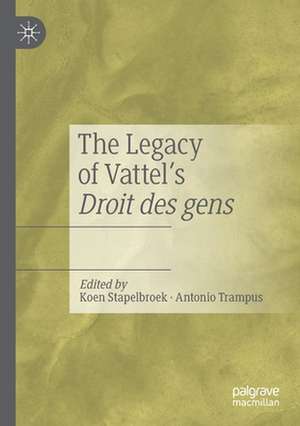The Legacy of Vattel's Droit des gens
Editat de Koen Stapelbroek, Antonio Trampusen Limba Engleză Paperback – 25 aug 2020
| Toate formatele și edițiile | Preț | Express |
|---|---|---|
| Paperback (1) | 453.98 lei 6-8 săpt. | |
| Springer International Publishing – 25 aug 2020 | 453.98 lei 6-8 săpt. | |
| Hardback (1) | 531.07 lei 6-8 săpt. | |
| Springer International Publishing – 24 aug 2019 | 531.07 lei 6-8 săpt. |
Preț: 453.98 lei
Nou
Puncte Express: 681
Preț estimativ în valută:
86.90€ • 94.42$ • 73.04£
86.90€ • 94.42$ • 73.04£
Carte tipărită la comandă
Livrare economică 21 aprilie-05 mai
Preluare comenzi: 021 569.72.76
Specificații
ISBN-13: 9783030238407
ISBN-10: 3030238407
Pagini: 296
Ilustrații: IX, 296 p. 1 illus.
Dimensiuni: 148 x 210 mm
Greutate: 0.4 kg
Ediția:1st ed. 2019
Editura: Springer International Publishing
Colecția Palgrave Macmillan
Locul publicării:Cham, Switzerland
ISBN-10: 3030238407
Pagini: 296
Ilustrații: IX, 296 p. 1 illus.
Dimensiuni: 148 x 210 mm
Greutate: 0.4 kg
Ediția:1st ed. 2019
Editura: Springer International Publishing
Colecția Palgrave Macmillan
Locul publicării:Cham, Switzerland
Cuprins
Koen Stapelbroek and Antonio Trampus – The legacy of Vattel’s Droit des gens: contexts, concepts, reception, translation and diffusion.- PART I: Vattel’s ideas and his context.- Radoslaw Szymanski – Vattel as an intermediary between the economic society of Berne and Poland.- Frederic Iéva – “A poor imitation of Grotius and Pufendorf?” Biographical uncertainties and the laborious genesis of Vattel’s Droit des gens.- Alberto Carrera – The citizen’s right to leave his country: The concept of exile in Vattel’s Droit des Gens.- Koen Stapelbroek – The foundations of Vattel’s ‘system’ of politics and the Seven Years’ War: moral philosophy, luxury and the constitutional commercial state.- Antonella Alimento – Publication strategies and reform politics: the French circulation of Vattel’s Droit des gens.- PART II: The reception of Vattel in Italy and elsewhere.- Antonio Trampus – Good government and the sovereignty of small states: the Eighteenth and Nineteenth century reception of the Droit des gens.- Danilo Pedemonte – Vattel in the Republic of Genua: theory and practice.- Alberto Clerici – Vattel in the Papal State. Anti-Prussian propaganda and the Law of nations in Italy during the Seven Years’ War.- Gert-Fredrik Malt – Vattel's system for subjects in international law and the establishment of Norway as a Nation in 1814.- Elisabetta Fiocchi Malaspina – The legacy of Vattel’s Droit des gens in the long nineteenth century.-
Notă biografică
Koen Stapelbroek is Associate Professor at Erasmus University Rotterdam, the Netherlands. His research focuses on intellectual history and political thought.
Antonio Trampus is Professor of Modern History at Ca’ Foscari University Venice, Italy. His research focuses on cultural history and constitutionalism.
Antonio Trampus is Professor of Modern History at Ca’ Foscari University Venice, Italy. His research focuses on cultural history and constitutionalism.
Textul de pe ultima copertă
This edited collection offers a reassessment of the complicated legacy of Emer de Vattel’s Droit des gens, first published in 1758. One of the most influential books in the history of international law and a major reference point in the fields of international relations theory and political thought, this book played a role in the transformation of diplomatic practice in the eighteenth and nineteenth century. But how did Vattel’s legacy take shape? The volume argues that the enduring relevance of Vattel’s Droit des gens cannot be explained in terms of doctrines and academic disciplines that formed in the late nineteenth and twentieth centuries. Instead, the chapters show how the complex reception of this book took shape historically and why it had such a wide geographical and disciplinary appeal until well into the twentieth century. The volume charts its reception through translations, intellectual, ideological and political appropriations as well as new practical usages, and explores Vattel’s discursive and conceptual innovations. Drawing on a wide range of sources, such as archive memoranda and diplomatic correspondences, this volume offers new perspectives on the book’s historical contexts and cultures of reception, moving past the usual approach of focusing primarily on the text. In doing so, this edited collection forms a major contribution to this new direction of study in intellectual history in general and Vattel’s Droit des gens in particular.
Caracteristici
Reassesses the complicated legacy of Emer de Vattel’s Droit des gens, first published in 1758 but whose legacy endured until well into the twentieth century Explores how Vattel’s work shaped international law, international relations theory, political thought and diplomatic practice Takes a new approach to Vattel’s work and intellectual history more widely, investigating the complex reception history of the book and its historical context, beyond the text itself
